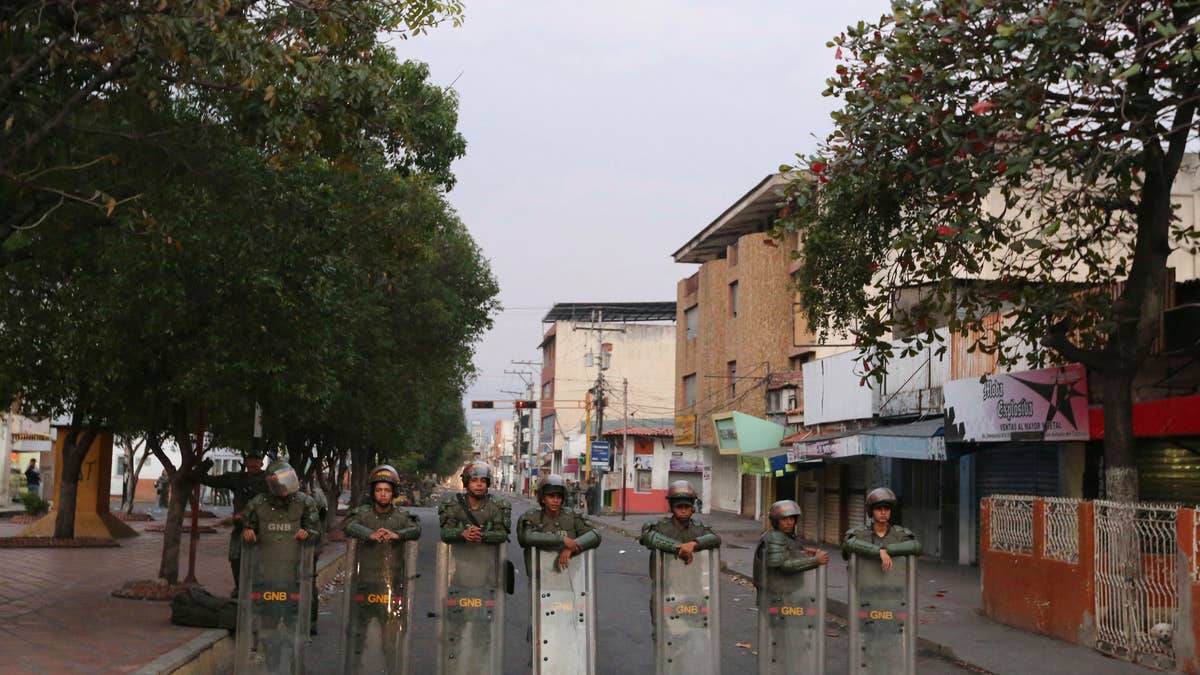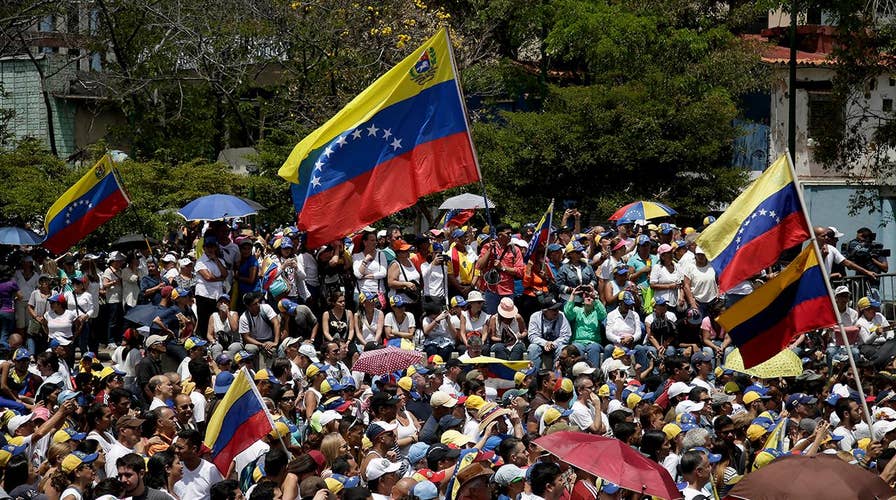Senate subcommittee opens hearing on path to democracy in Venezuela
Lawmakers hear testimony on how to achieve a transition of power and address the humanitarian crisis in Venezuela as the Maduro regime holds on to power; Rich Edson reports from the State Department.
More than 200 exiled Venezuelan soldiers were ready for a standoff with their former comrades last month, when the Colombian government stepped in and brought it to a halt.
The incident happened as part of a plan to help a convoy led by U.S. officials and Venezuelan opposition leader Juan Guaido get humanitarian aid from Colombia into Venezuela. The exiled soldiers, with weapons at the ready, planned to make sure the convoy could get the aid safety into Venezuela.
But a Bloomberg News report says Colombian authorities grew concerned that effort – which involved confronting Venezuelan national guardsmen who were trying to keep those delivering aid from crossing the border -- would end in violence, damaging what they had vowed would be a peaceful humanitarian undertaking.
Little humanitarian aid made it in. And the dogged attempts by the pro-Maduro military to block it from getting into the country underscored the harsh reality that too forces remain loyal to the socialist president for any change in leadership to happen soon.
Many experts thought U.S. sanctions, particularly the recent one targeting the state-run oil company PDVSA, would badly damage President Nicolas Maduro’s hold on power. Guaido had called the sanctions a critical part of stopping Maduro from consolidating power in what he calls a “dictatorship.”
HUNDREDS OF VENEZUELA'S MILITARY DEFECT IN FOUR DAYS AS COUNTRY SPIRALS INTO FURTHER CHAOS
In a speech in the Senate on Thursday, Senator Bob Menendez, the ranking Democrat on the Foreign Relations Committee, noted: “Despite our collective hopes, the events of the last several weeks did not lead to the quick win the administration seemed to expect. As we have learned throughout our history as a nation, confronting tyranny requires sustained commitment.”

Venezuelan Bolivarian National Guards line up to block the main entrance of Simon Bolivar bridge to San Antonio after being closed by Venezuelan Bolivarian National Guards officers in San Antonio, Venezuela, Saturday, Feb. 23, 2019. (AP Photo/Fernando Llano)
“It is increasingly clear that the struggle for democracy and freedom in Venezuela is going to take time, discipline, and a strategy based on a keen understanding of the complex situation on the ground. But Maduro is not invincible; he’s far from it…So we must ask: where do we go from here? As the Guaidó Government works to restore democracy, the global community must not waver in our support for the Venezuelan people.”
Retired Venezuelan General Cliver Alcala, who like so many other exiled leaders and rank-and-file members of Venezuela’s military is exiled in Colombia, told Bloomberg News he would lead the former Venezuelan soldiers across the border to deliver aid. He also told Bloomberg he could see why Colombia did not want the plan to be executed.
Some 500 members of the military have defected, and many now live in Colombia.
Venezuela's military has served as the traditional arbiter of political disputes, and forced out dictator Marcos Perez Jimenez in 1958. But the top military brass has stood fast with Maduro, who has shown no sign he intends to relinquish power.
While Guaido has proposed amnesty to military officers who back him, the low-ranking soldiers who have defected say breaking ranks with Maduro is all but impossible. Even as the number fleeing swells, they represent a small percentage of the 200,000-plus troops in Venezuela's army.
Anyone who shows the slightest hint of disapproval risks arrest and jail has become increasingly synonymous with torture.
Some have called for military intervention in Venezuela, but there are no real plans for one, so far.
CLICK HERE TO GET THE FOX NEWS APP
Hector Schamis, a senior adviser to the secretary general of the Organization of American States, expressed concern – which he said is not to be taken as the view of the OAS – that waiting too long to act forcefully on Venezuela can lead to a disaster.
“I am saying that the world waited on Bosnia and Kosovo way too long,” Bloomberg News quoted Schamis as saying. “It’s important for Latin American governments to get involved here. We are beyond the Cold War and gunboat diplomacy. This is the biggest refugee crisis in Latin American history. We need to debate all options without prejudice.”
The Associated Press contributed to this report.

